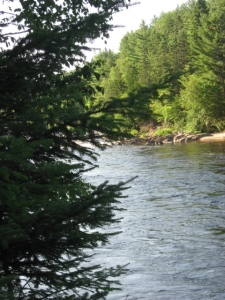 Bush-whacking the environment. That’s the best way to describe Prime Minister Stephen Harper’s George W. Bush-esque approach: When you can’t change the laws with public approval, just go ahead and do it any way you can.
Bush-whacking the environment. That’s the best way to describe Prime Minister Stephen Harper’s George W. Bush-esque approach: When you can’t change the laws with public approval, just go ahead and do it any way you can.
In Bush’s case, he simply side-stepped Congress, the branch of government that’s supposed to make laws, and surreptitiously destroyed decades of environmental improvements by rewriting rules at the administrative level of government instead.
What do I mean?
When the U.S. Congress passes a bill, the administrative agency responsible for the dossier creates regulations that allow it to carry out the law’s intention. Administrative agencies and departments — the Environmental Protection Agency, the departments of Justice and Energy — are part of the Executive branch of the federal government, and when a new Chief Executive takes office, he’s free to hire, fire and review the regulatory framework that he inherits. While Congressional representatives are highly accountable, changes made through regulations often occur without public scrutiny.
Bush was able to destroy the substantial gains the U.S. had made in air and water quality over several decades by changing the rules and rulers within his EPA and Energy departments. But like Harper has recently done, he tripped up when he overstepped his bounds.
In 2002, unable to get his environmental agenda through Congress, Bush, through rule changes, blocked progress on addressing carbon emissions and effectively eliminated many environmental safeguards, including regulations protecting wildlife in national forests and others requiring old power plants to install pollution control devices when they made significant improvements.
That did it! Citizens groups and several states took the Bush administration to court, arguing that the regulatory changes were so sweeping that they violated the mandates of the laws Congress had adopted. Fortunately, the U.S. system of checks and balances allows the judicial branch to kick in when the executive branch gets out of control.
“Over and over again during the Bush administration, the courts overturned agency actions that threatened to gut environmental safeguards,” says Trip Van Noppen, President of Earthjustice, a U.S. environmental law group active in many of the cases. “The public, speaking through many citizen groups and through state governments, were able to show that the Bush actions were contrary to sound science and to the law.”
So how does this apply to Harper? Granted, Canada’s system of parliamentary “democracy” functions differently, but is this just something citizens have to accept when a majority government controls Parliament?
Recently, more than 1,000 employees at Canada’s Department of Oceans and Fisheries were told their jobs may be in jeopardy. Harper is eliminating the DFO program that monitors contaminants in oceans. We also learned, through media leaks, that he’s eliminating key smokestack monitors who oversee Canadian air.
The proposed Northern Gateway pipeline that will feed Asia will have to cross 600 rivers and streams to bring energy from Alberta to British Columbia, and Harper is bulldozing his authority to make sure he gets his way.
Like Bush, he’s trying to replace statutes, laws written by Parliament, with regulations, much easier to change, and with ministerial discretion, giving his cabinet ministers huge leeway in deciding the scope of environmental assessments.
But he goes even further than Bush: With the help of his docile MPs, he’s gutting statutes —the Fisheries Act, for example, which requires federal review if a project is to adversely impact fish habitats. (Many scientists are outraged; the new law requires review only if the fish are important for First Nations, commercial or recreational purposes.)
He’s repealing altogether the Canadian Environmental Assessment Act and replacing it with “another weaker statute that does not legally require any environmental assessment of any project and mainly serves as a framework to maximize the discretion in the Prime Minister’s hands on any given environmental assessment,” says University of Ottawa law professor Stephen Hazell. (The new law also makes it harder for environmental groups to intervene in the assessment process.)
And he’s embedding his proposed environmental changes in a 400-plus page budget bill, thus leaving decisions to a finance committee instead of a more appropriate one, such as the Standing Committee on Oceans and Fisheries.
Unlike Bush, however, much of what Harper is doing is perfectly legit, Hazell explains. “The difference between Bush’s and Harper’s approach is that Harper has a majority of MPs in Parliament so he can destroy environmental statutes as well as regulations.”
Ouch!
Are you as outraged by Harper’s modus operandi as the rest of Canadians who’ve taken to protesting? If so, you can express your concern by signing this petition along with more than 40,000 others who have already done so.
Harper, we know what you’re up to — and we’re not going to let you get away with Bush-whacking our precious resources.


Great article!! Thanks for speaking out! I subscribe to David Suzuki’s newsletter. Lots of good information there too. http://www.davidsuzuki.org/blogs/science-matters/2012/05/speak-out-for-the-environment-and-democracy-on-june-4/
LikeLike
Really good article and very candid!!!
LikeLike